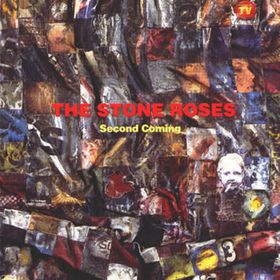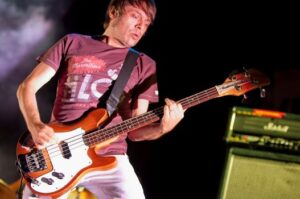
From wikipedia.org / © Katherine Barton and Gaz Davidson
I was shocked and saddened to hear about the death on November 20th of Gary ‘Mani’ Mountfield, bass player with the Stone Roses from 1987 to 1996 and 2011 to 2017 and with Primal Scream for the 15 years between his spells in the Roses.
Shocked because Mani seemed such an exuberant figure (in keeping with his exuberant bass sound) that he was the very last rock-and-roll-related personage I’d expect to die at the relatively young age of 63. I’ve seen plenty of other rock-and-roll figures on stage who did look ready to kick the bucket because of their frailty, ravaged-ness and general air of vulnerability. But not Mani, who was always ebullient. In fact, just days before his passing, he’d announced dates for a speaking tour of the United Kingdom planned for next year, which doesn’t sound like someone on their last legs.
Hailing – of course – from Manchester, Mani first played in two bands that were prototypes for the Stone Roses, the Fireside Chaps (with future Roses guitarist John Squire) and the Waterfront (with future Roses singer Ian Brown joining in 1983). The Roses’ definite line-up finally coalesced in 1987 with him, Brown, Squire and drummer Alan ‘Reni’ Wren. During the 1980s he also found time to play in a band called the Mill alongside Clint Boon, who’d later furnish humble but durable ‘Madchester’ band the Inspiral Carpets with their quirky keyboard sound.
Along with the Happy Mondays – and, okay, the Inspiral Carpets – the Stone Roses were the leading lights of the late 1980s / early 1990s Madchester movement, which irresistibly grafted the riffs of rock music onto the grooves of dance music and promoted a cheery, unpretentiously hedonistic vibe far removed from the posing and self-consciousness that’d plagued British popular music earlier in the 1980s. It also paved away for the more internationally successful, but aesthetically less interesting, Britpop explosion of the mid-1990s. Mani’s bass was an essential part of the formula. For instance, it’s the first instrument you hear on I Want to be Adored, the opening track on the Stone Roses’ eponymous and massively acclaimed album of 1989.
Sadly, legal wrangles and musical procrastination meant it was a long time before a second Stone Roses album appeared. Second Coming finally saw the light of day in 1994, five-and-a-half years later. Inevitably, after the wait and all the attendant anticipation, it was deemed a disappointment by the critics. I have to say I think Second Coming is sorely underrated. I fully understand why Simon Pegg, in Shaun of the Dead (2004), refuses to throw it along with the rest of his record collection at two advancing zombies. “I like it,” he affirms.
I saw the Stone Roses for the first and last time during the tour they did on the back of Second Coming. In 1995 they played a gig in the Japanese city of Sapporo, where I was living at the time. It was not a happy experience. Ian Brown was in a foul mood and gave the impression of wanting to be somewhere else – anywhere else. To be fair, a trio of Australian bodybuilders had beaten Brown up in a club in Tokyo a few days earlier, which gave him a credible reason for his lack of enthusiasm. Mani and the rest of the band played perfectly well.

© Geffen Records
Also slightly unhappy was the next occasion I saw Mani perform, which was after he’d joined Scottish band Primal Scream, another outfit intent on exploring the overlap between rock music and dance music. The band were on the bill of a one-day event on Glasgow Green that I attended in 2000. While they were limbering up to play the song Sick City from their new album XTRMNTR, Mani cheerfully barked into a microphone, “This is dedicated to Glasgow because it really is… a sick city!” For a large portion of the Glaswegian crowd, this comment went down like a cup of – appropriately – cold sick. (By the way, this was before ‘sick’ acquired its modern, slang meaning of ‘really good’.) Later, Mani felt obliged to announce that he was only joking and, really, “Glasgow isn’t a sick city at all!” It’d been some banter that folk took the wrong way, but it impressed me that he was man enough to apologise for it.
I saw the Mani-era Primal Scream on two further occasions: at London’s Brixton Academy in 2003, when I thought they were pretty good; and at Norwich’s University of East Anglia in 2009, when they were on blistering form. In fact, I’d include their 2009 Norwich show in my personal ‘Top Ten Gigs of All Time’. With his jolly, everyman demeanour, Mani provided some balance to Primal Scream’s frontman Bobby Gillespie, whom I always found a bit too-cool-for-school when they played live.
Before joining the reformed Stone Roses in 2011, Mani found time to participate in another band, a ‘supergroup’ called Freebass whose gimmick was that it had three – three! – famous bass players, all from the Manchester area. Its line-up also included Andy Rourke, former bassist with the Smiths, and Peter Hook, former bassist with Joy Division and New Order. The project ended ignominiously, with Mani taking exception to what he saw as Hook unjustly exploiting the legacy of Joy Division and his late Joy Division bandmate Ian Curtis – Hook had also formed an outfit called Peter Hook and the Light that performed old Joy Division songs. Hook’s wallet, Mani claimed on social media, was visible from space because it was ‘stuffed with Ian Curtis’s blood money.’ Needless to say, the two fell out, though later – again – Mani apologised and he and Hook made up.
Indeed, Hook has been one of the many musicians who’ve paid tribute to Mani since his death was announced a few days ago. Other condolences have come from members of the Stone Roses, Primal Scream, the Happy Mondays, New Order, the Smiths, the Charlatans, the Verve, Echo and the Bunnymen, Elbow, the Courteneers, the Farm, Ocean Colour Scene, Kasabian, Shed Seven, Badly Drawn Boy… I’m not a big fan of Oasis, but I thought it touching that, at their concert in Brazil the other night, Liam and Noel Gallagher projected Mani’s face onto the giant screen behind the stage whilst performing Live Forever (1994). You get the impression you could go around everybody involved in the British music scene in the 1980s and 1990s and not find anyone with a bad word to say about the guy.
Finally, I owe Mani some gratitude. Years ago – around 2010, I think – I was trying to think of a pseudonym to put on a horror short story I was about to submit to a magazine. ‘Ian Smith’ seemed too dull a name to attach to a piece of short fiction that was meant to chill the blood. At the time, I had a Primal Scream album playing in the background and I suddenly thought, “They’ve really had a second wind since Mani joined them.” Then it occurred to me: Mani’s real name was Gary Mountfield. ‘Mountfield’ sounded about right for a pseudonym – it wasn’t too exotic, but not too common either. (Mountfield was also the name of a village in Country Tyrone, Northern Ireland, where I used to live, so it had a personal connection with me too.) Thus, the penname Jim Mountfield was born. It’s adorned nearly 70 published short stories since then.
So, thank you for the inspiration, Mani.

From wikipedia.org / © livepict.com
